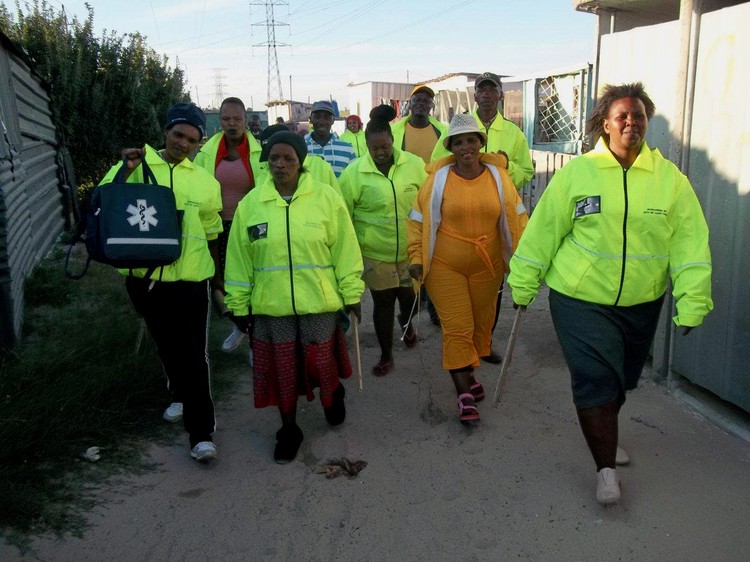Khayelitsha neighbourhood watch patrollers ask government for support
We patrol around the township barehanded, say members
Members of Sakumlandela Neighbourhood Watch (NHW) say they need equipment, police support and training to help them keep schools and the community safe in Green Point, Khayelitsha.
“We patrol around the township barehanded,” said Luzuko Lengesi, chairperson of Sakumlandela and Sector Three Forum in Khayelitsha.
The patrollers want the Western Cape Department of Community Safety (DOCS) to give them safety boots, trousers, food, sjamboks, walkie-talkies and pepper-sprays.
Lengesi said some patrollers wear flip-flops and sneakers during community patrols because they have no money to buy better shoes or boots.
Ntombomzi Mafaya, a patroller, said: “My flip-flops get stuck in the mud when I chase drunks or accompany them to their places at night. I need safety boots.”
Lengesi said, “We starve while we work … We buy a two-litre of Twizza to energise ourselves.”
Lengesi said they also need walkie-talkies to communicate with each other and with the police. “When we approach criminals roaming the streets, they say, ‘You don’t even have police support’, and [they] threaten to shoot us,” he said.
“When we phone the police, they say the vans are unavailable and cops on duty are too few to go out and support us.”
The patrollers also want to be trained in first aid to help injured crime victims.
“We break up drunken fights involving bleeding revellers. The training will help us give them first aid,” said Lengesi.
Lengesi said the patrollers want the Western Cape Education Department to hire them to guard schools during the school holidays. “The department uses its budget to hire expensive security companies … Why can’t it hire us, because we do the job on school days anyway?” he asked.
Ward Councillor Thando Pimpi said he and residents established the neighbourhood watch in February last year to combat crime. “The residents have noticed the success and impact of the neighbourhood watch,” he said.
Pimpi said: “The patrollers use their airtime to communicate with each other or with the police because they have no walkie-talkies.”
He said they wanted DOCS to hire the patrollers full-time and the WCED to give them incentives.
Bronagh Hammond, Western Cape Education Department spokesperson, said, “We appreciate the work NHW do to help protect our schools but unfortunately cannot employ them in the capacity that they want … We only do business with companies who are registered with PSIRA and those that are registered on the Central Supplier Database.”
Ayesha Fortune, spokesperson for DOCS, said, “We do not provide food or stipends for neighbourhood watches … We do not provide employment as we are not mandated to do so.”
However, Fortune said the patrollers would receive a starter kit at the end of March.
DOCS also offers free training “on a first come first serve basis” in First Aid Level 1, Basic Fire-fighting and Basic Neighbourhood Watch, she said.
Western Cape police spokesperson FC van Wyk said residents “are welcome to consult the station commander with regards to service delivery complaints”.
Next: Human Settlements make about turn on “poorly built” RDP foundations
Previous: 15% of SA’s wealth is in the hands of just 3,500 people, study finds
© 2020 GroundUp.
This article is licensed under a Creative Commons Attribution-NoDerivatives 4.0 International License.
You may republish this article, so long as you credit the authors and GroundUp, and do not change the text. Please include a link back to the original article.



